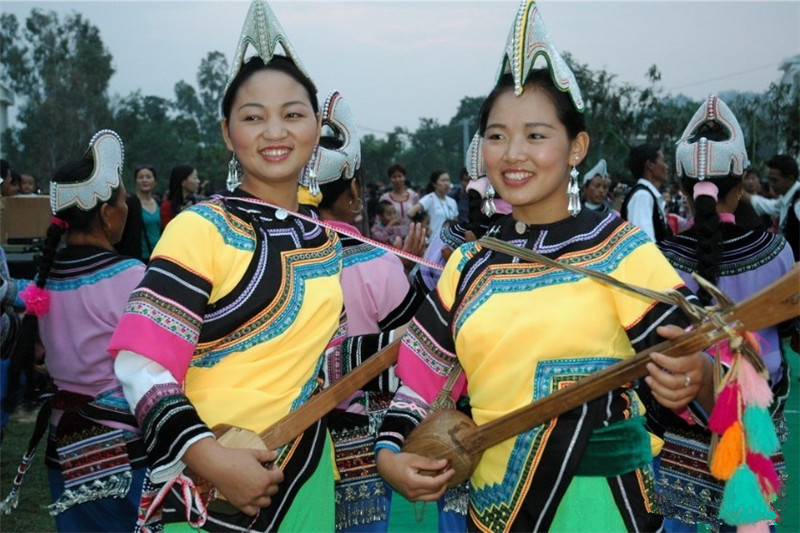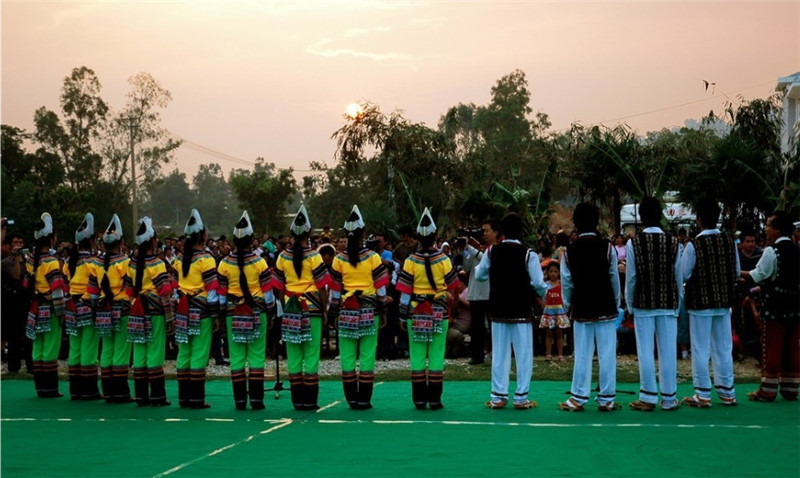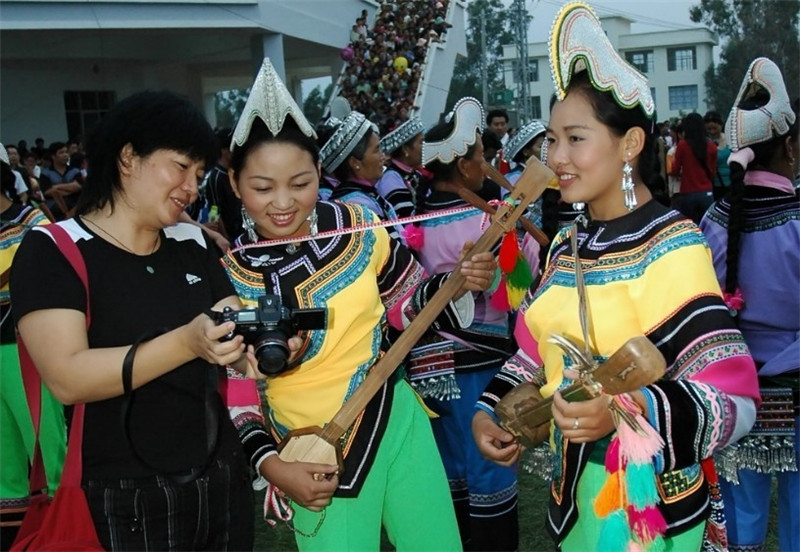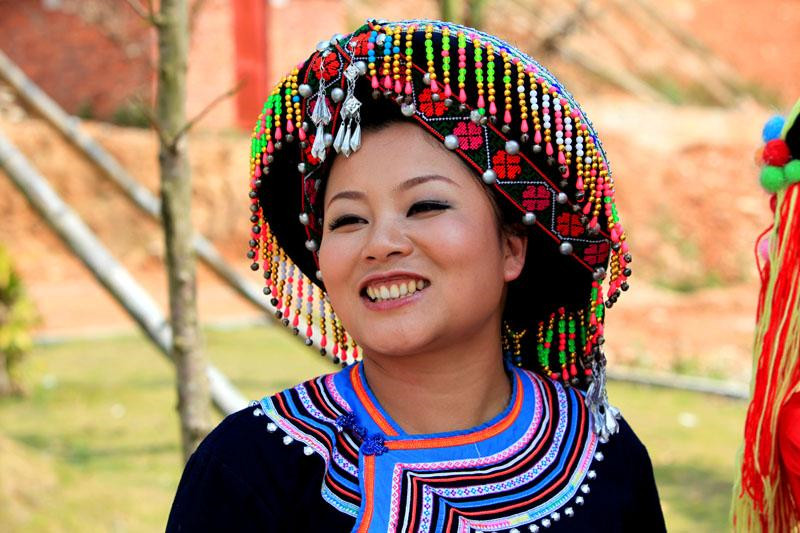 alt="Puer Surrounding Counties and Towns: Weekly & Special Local Markets Travel Guide"
/>
alt="Puer Surrounding Counties and Towns: Weekly & Special Local Markets Travel Guide"
/>
Girls Festival (Guniangjie) of Hani Ethnic Minority in Yuanyang County, Honghe
Overview
- Chinese Name: 元阳县哈尼族姑娘节
- English Name: Girls Festival (Guniangjie) of Hani Ethnic Minority
- Location: 元阳县攀枝花乡碧播村碧播山/Bibo Mountain, Bibo Village, Panzhihua Township, Yuanyang County
The Girls Festival, known as Guniangjie, is an important cultural celebration for the Hani ethnic minority in Yuanyang County. This vibrant festival is primarily dedicated to young women and holds significant cultural and social importance. The Girls Festival (Guniangjie) is a vibrant and culturally rich celebration for the Hani ethnic minority in Yuanyang County. Through its traditional activities and communal participation, it fosters a sense of identity, heritage, and social bonding among the young people of the Hani community.

Origins
Guniangjie, or the Girls Festival, has historical roots that date back centuries within the Hani culture. Traditionally celebrated by Hani girls and women, the festival marks the coming of age for young girls and serves as a platform for them to showcase their beauty, talents, and potential for future marriages. It is believed to also have connections to ancient agricultural rites, celebrating the fertility of the land and the community. The festival occurs on the 15th day of the third month of the lunar calendar.

Significance
- Cultural Identity: Guniangjie serves as a celebration of Hani cultural identity, allowing the community to honor their traditions, languages, and local customs. It plays a crucial role in the preservation of Hani heritage.
- Coming of Age: The festival signifies the transition of young girls into womanhood. It is a time for celebration and recognition of their maturity, beauty, and readiness for societal roles, including marriage.
- Social Interaction: Guniangjie provides an opportunity for social interaction among the youth, facilitating connections between young men and women in the community. It fosters relationships and may lead to future marriages.

Local Activities
- Dressing in Traditional Attire: Young girls and women wear colorful, ornate traditional costumes adorned with intricate embroidery, beads, and silver jewelry. The attire reflects their cultural identity and serves to highlight their beauty during the festivities.
- Dances and Songs: Traditional Hani dances and songs play a central role in the celebration. Participants often perform group dances in a joyful and vibrant manner, showcasing their cultural heritage and artistic expression.
- Competitions: The festival often features various competitions, such as beauty contests, singing, and dancing competitions, where young women display their talents. These events serve as a platform for young women to gain recognition within the community.
- Games and Sports: Traditional games and sports are also a part of the festivities. These might include activities like tug-of-war, footraces, and other fun competitions that involve both young men and women, promoting camaraderie and healthy competition.
- Feasting: Community feasts are an integral part of the festival, where families and friends gather to share traditional Hani dishes. The sharing of food symbolizes unity and community spirit.
- Cultural Exhibitions: Local artisans and craftsmen may display their handicrafts and goods during the festival, providing visitors with the opportunity to engage with Hani culture and support local creativity.


 7 Days GolfingTour
7 Days GolfingTour
 8 Days Group Tour
8 Days Group Tour
 8 Days Yunnan Tour
8 Days Yunnan Tour
 7 Days Shangri La Hiking
7 Days Shangri La Hiking
 11 Days Yunnan Tour
11 Days Yunnan Tour
 6 Days Yuanyang Terraces
6 Days Yuanyang Terraces
 11 Days Yunnan Tour
11 Days Yunnan Tour
 8 Days South Yunnan
8 Days South Yunnan
 7 Days Tea Tour
7 Days Tea Tour
 8 Days Muslim Tour
8 Days Muslim Tour
 12 Days Self-Driving
12 Days Self-Driving
 4 Days Haba Climbing
4 Days Haba Climbing
 Tiger Leaping Gorge
Tiger Leaping Gorge
 Stone Forest
Stone Forest
 Yunnan-Tibet
Yunnan-Tibet
 Hani Rice Terraces
Hani Rice Terraces
 Kunming
Kunming
 Lijiang
Lijiang
 Shangri-la
Shangri-la
 Dali
Dali
 XishuangBanna
XishuangBanna
 Honghe
Honghe
 Kunming
Kunming
 Lijiang
Lijiang
 Shangri-la
Shangri-la
 Yuanyang Rice Terraces
Yuanyang Rice Terraces
 Nujiang
Nujiang
 XishuangBanna
XishuangBanna
 Spring City Golf
Spring City Golf
 Snow Mountain Golf
Snow Mountain Golf
 Stone Mountain Golf
Stone Mountain Golf













 What Our Customers Say?
What Our Customers Say?
